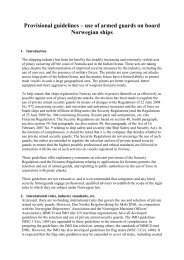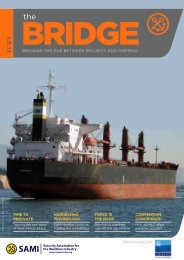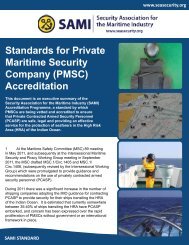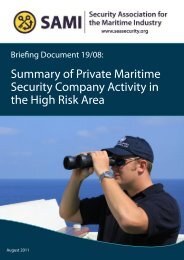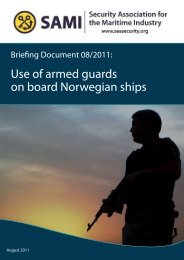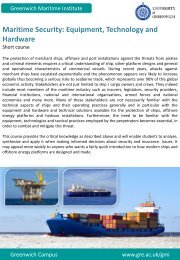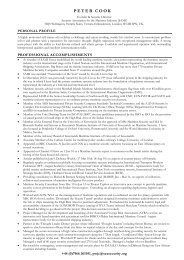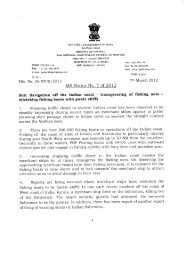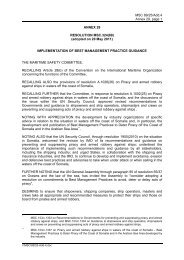SAMI Briefing Maritime Labour Convention FAQs and Text March 2013
SAMI Briefing Maritime Labour Convention FAQs and Text March 2013
SAMI Briefing Maritime Labour Convention FAQs and Text March 2013
Create successful ePaper yourself
Turn your PDF publications into a flip-book with our unique Google optimized e-Paper software.
<strong>Maritime</strong> <strong>Labour</strong> <strong>Convention</strong>, 2006(a)(b)(c)(d)(e)able seafarer means any seafarer who is deemed competent to perform any dutywhich may be required of a rating serving in the deck department, other than theduties of a supervisory or specialist rating, or who is defined as such by nationallaws, regulations or practice, or by collective agreement;basic pay or wages means the pay, however composed, for normal hours of work;it does not include payments for overtime worked, bonuses, allowances, paidleave or any other additional remuneration;consolidated wage means a wage or salary which includes the basic pay <strong>and</strong> otherpay-related benefits; a consolidated wage may include compensation for all overtimehours which are worked <strong>and</strong> all other pay-related benefits, or it may includeonly certain benefits in a partial consolidation;hours of work means time during which seafarers are required to do work on accountof the ship;overtime means time worked in excess of the normal hours of work.Guideline B2.2.2 – Calculation <strong>and</strong> payment1. For seafarers whose remuneration includes separate compensation for overtimeworked:(a) for the purpose of calculating wages, the normal hours of work at sea <strong>and</strong> in portshould not exceed eight hours per day;(b) for the purpose of calculating overtime, the number of normal hours per weekcovered by the basic pay or wages should be prescribed by national laws or regulations,if not determined by collective agreements, but should not exceed48 hours per week; collective agreements may provide for a different but not lessfavourable treatment;(c) the rate or rates of compensation for overtime, which should be not less than one<strong>and</strong> one-quarter times the basic pay or wages per hour, should be prescribed bynational laws or regulations or by collective agreements, if applicable; <strong>and</strong>(d) records of all overtime worked should be maintained by the master, or a personassigned by the master, <strong>and</strong> endorsed by the seafarer at no greater than monthlyintervals.2. For seafarers whose wages are fully or partially consolidated:(a) the seafarers’ employment agreement should specify clearly, where appropriate,the number of hours of work expected of the seafarer in return for this remuneration,<strong>and</strong> any additional allowances which might be due in addition to the consolidatedwage, <strong>and</strong> in which circumstances;(b) where hourly overtime is payable for hours worked in excess of those covered bythe consolidated wage, the hourly rate should be not less than one <strong>and</strong> onequartertimes the basic rate corresponding to the normal hours of work as definedin paragraph 1 of this Guideline; the same principle should be applied to theovertime hours included in the consolidated wage;(c) remuneration for that portion of the fully or partially consolidated wage representingthe normal hours of work as defined in paragraph 1(a) of this Guidelineshould be no less than the applicable minimum wage; <strong>and</strong>(d) for seafarers whose wages are partially consolidated, records of all overtimeworked should be maintained <strong>and</strong> endorsed as provided for in paragraph 1(d) ofthis Guideline.28



